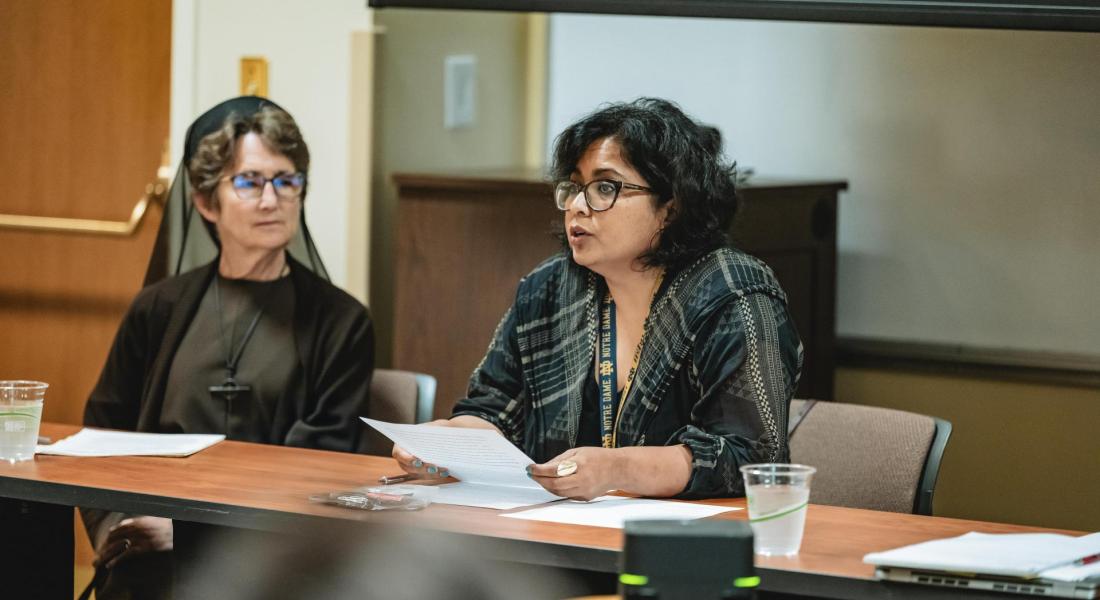
Political anthropologist Nusrat Chowdhury possesses a cultural memory of Bangladesh that the nation’s young students don’t. It grounds her perspective and informs her framework to assess political, economic, and social change – some of these changes rapid and recent, as was the case of July 2024 student protests that led to the end of authoritarian rule by Prime Minister Sheikh Hasina.
As is so often the case, it was Bangladeshi youth that acted. The students led a political movement that sparked an ever-widening and then tragically bloody revolution, drawing people from all walks of life and ultimately forcing Sheikh Hasina to flee on August 5.
“It’s the students who did everything,” says Chowdhury, an associate professor of anthropology at Amherst College and visiting fellow of the Kellogg Institute for International Studies. Her work, already focused on the role of crowds and communication in the political life of Bangladesh, takes on renewed importance as Dhaka builds a new national future under the interim leadership of Nobel Peace Prize laureate Muhammad Yunus (who received the Ford Family Notre Dame Award for International Development and Solidarity in 2018).
“What is striking about the so-called Gen Z is that they don’t know anything else. If only one party and one leader have been in power for 16 years, that means they actually have no memory of what happened before,” she said. Despite some semblance of stability, democracy was elusive during the AL regime.
“It’s been termed as kind of a Gen Z revolution, that their way of expressing themselves is intertextual with a certain kind of global popular culture that is new in the context of political slogans and graffiti,” explains Chowdhury. With her focus on language and visual culture, she presents pictures acquired during an October visit that make clear that what young people want is a new politics, free of the corruption that marked the 16-year tenure of Sheikh Hasina and her Awami League party.
Recent estimates put the flow of lost money at US$16 billion per year, according to an audit completed under Yunus. The 400-page report included seven of 29 projects completed in Bangladesh, where corruption and controversy over infrastructure development include a World Bank scandal that led to the withdrawal of $1.2 billion in financing for the Padma River bridge, a legacy project of Sheik Hasina. The debt loads and other financial challenges in Bangladesh led to double-digit inflation as cost of living skyrocketed, adding to food insecurity among the vulnerable and downward pressure on life expectancy. More than 1,500 people died as peaceful protests evolved into a violent uprising, according to Yunus.
In this context, and with a lens toward infrastructure development and high-end projects like Padma – the longest river bridge in Bangladesh – the Kellogg-supported research of Chowdhury serves as a broader exploration of how authoritarian leaders secure legitimacy through infrastructure. Her work follows on Chowdhury’s 2019 ethnography, Paradoxes of the Popular: Crowd Politics in Bangladesh (Stanford University Press). At Kellogg, Chowdhury has enjoyed the time and resources to work on her second book while offering expert opinions on the unfolding political situation in Bangladesh.
“Development is a political agenda,” Chowdhury says. It’s especially true of Bangladesh, where sea level rise and other climate impacts are among the world’s most threatening. But corruption has long been an open secret, and the mob killings linked to rumors about human sacrifice and the extreme affective charge around the river bridge illustrate how populist visions are also often challenged on the ground. .
Chowdhury has collected the images and messages that underscore this affective charge, including those of Sheik Hasina herself. In one case, she’s viewing the bridge construction on a mobile device with the bridge itself framed through the window in the background. In another, the ousted prime minister is seen crying over deaths at a rail station – but the question arises, was she crying for Bangladeshi youth demanding change, or at the destruction of a project that was integral to her own identity as a visionary leader?
What’s clear to Chowdhury is that despite age and experience, or political and cultural differences, the people of Bangladesh want reform to succeed as opposed to a default intervention by the military, which has been the case after similar uprisings in the past. While most of them are watching the work of the interim government with cautious optimism, it is clear that democracy is still hard work. But politics has indeed returned in Bangladesh.
The Kellogg Institute for International Studies, part of the Keough School of Global Affairs at the University of Notre Dame, is an interdisciplinary community of scholars and students from across the University and around the globe that promotes research, provides educational opportunities, and builds partnerships throughout the world on the themes of global democracy and integral human development.





